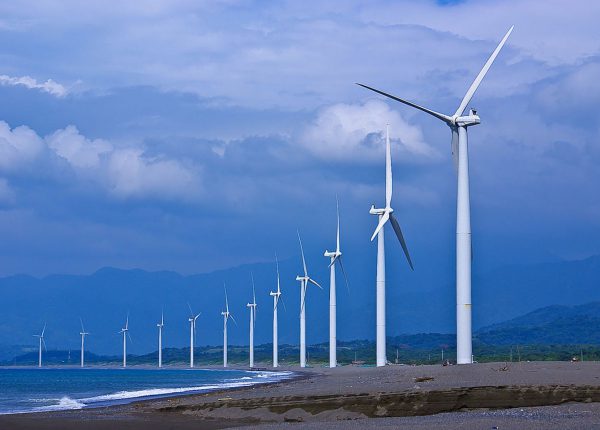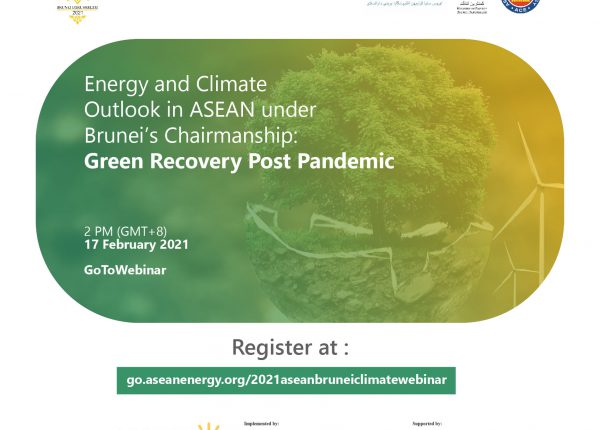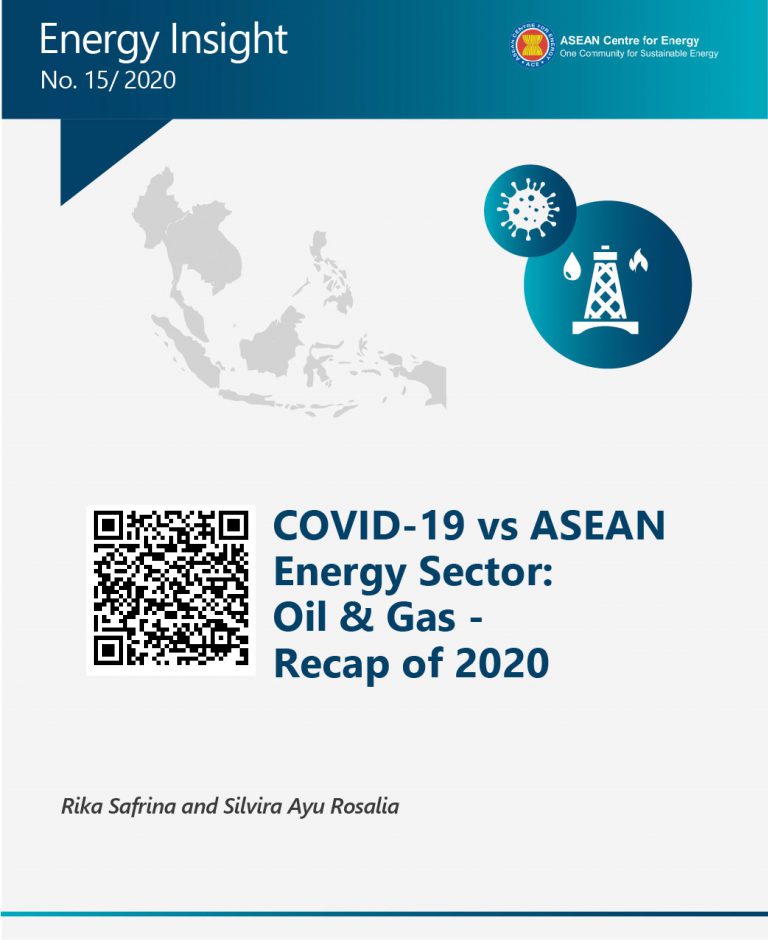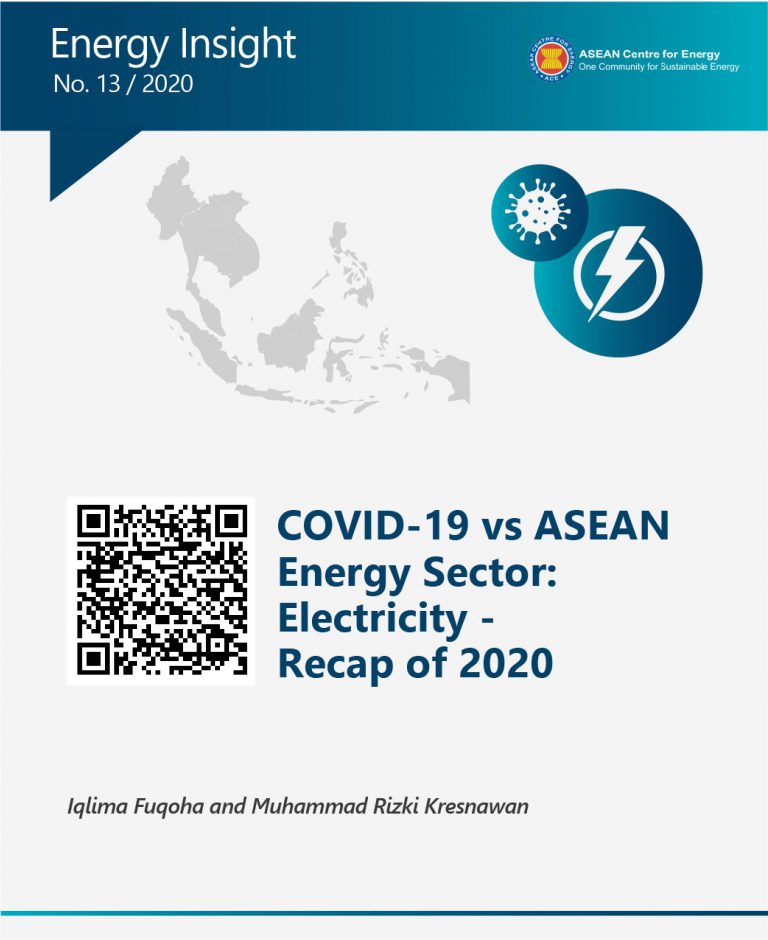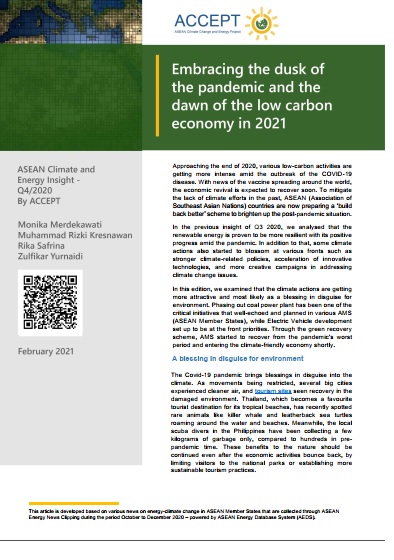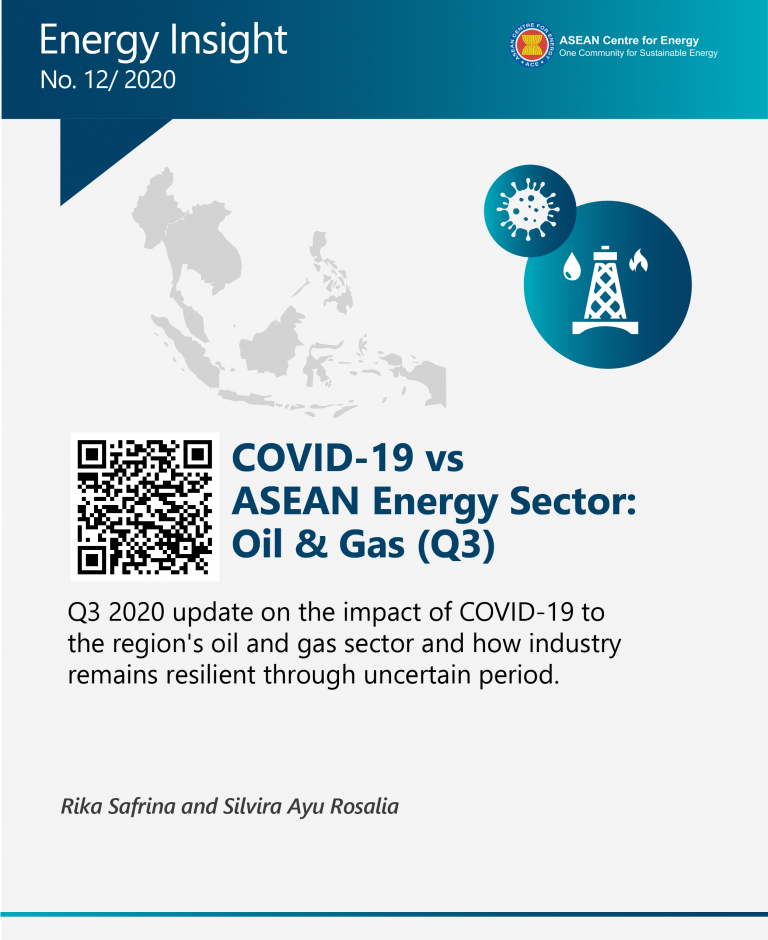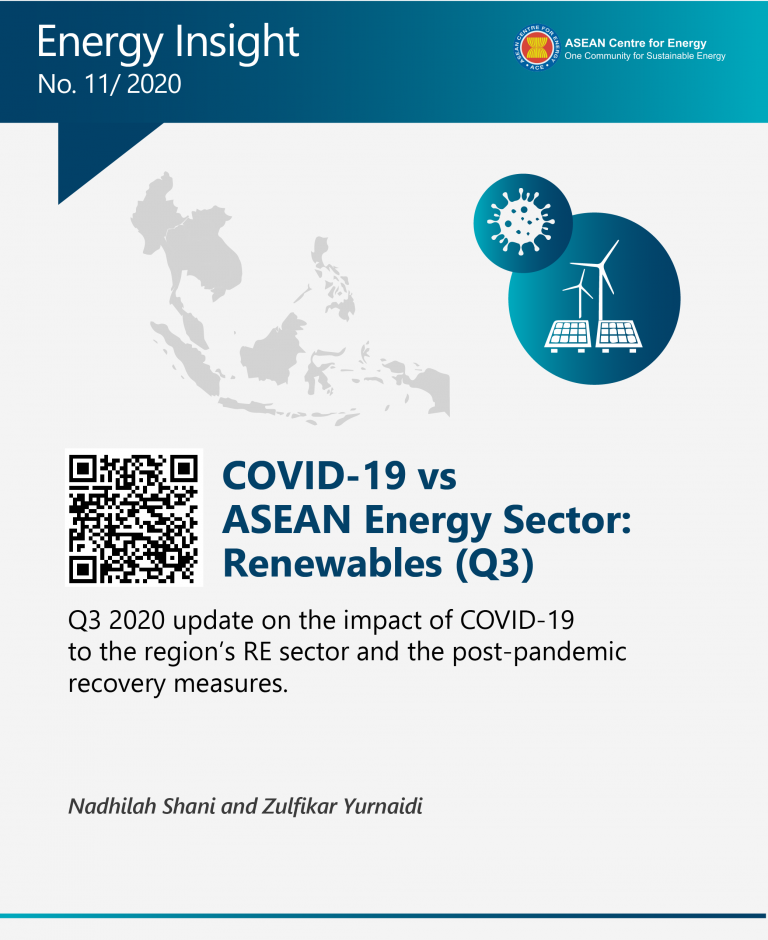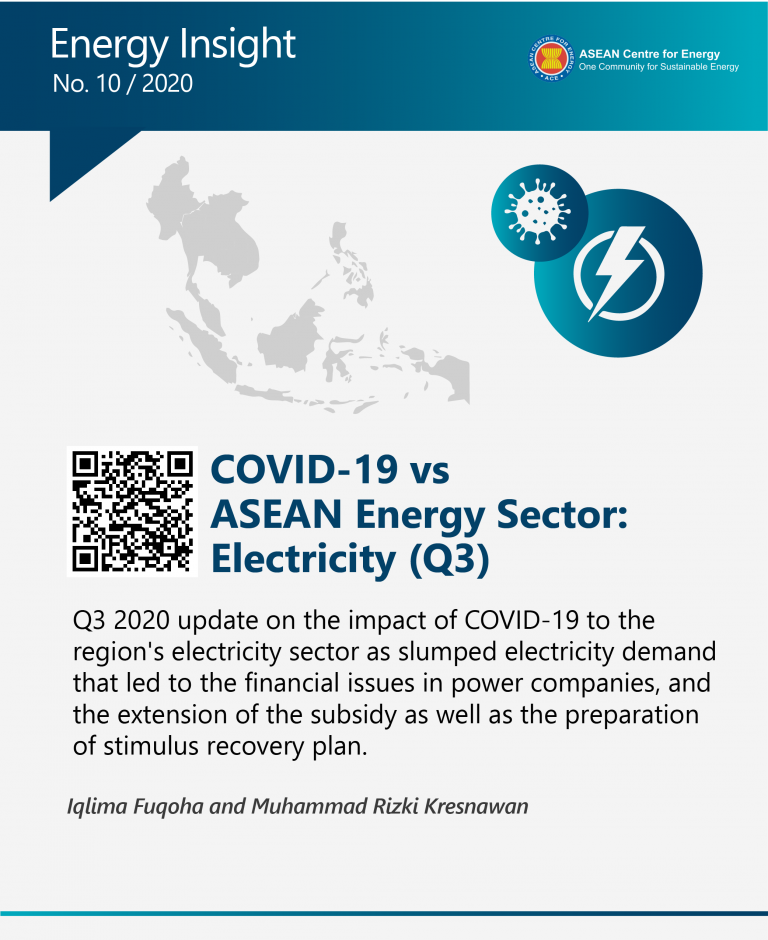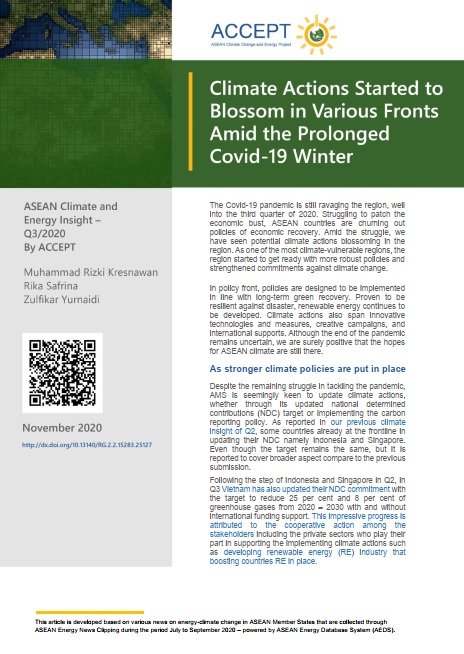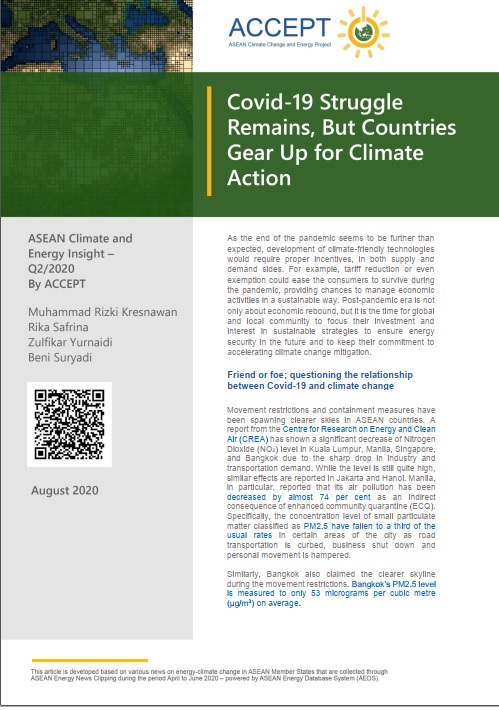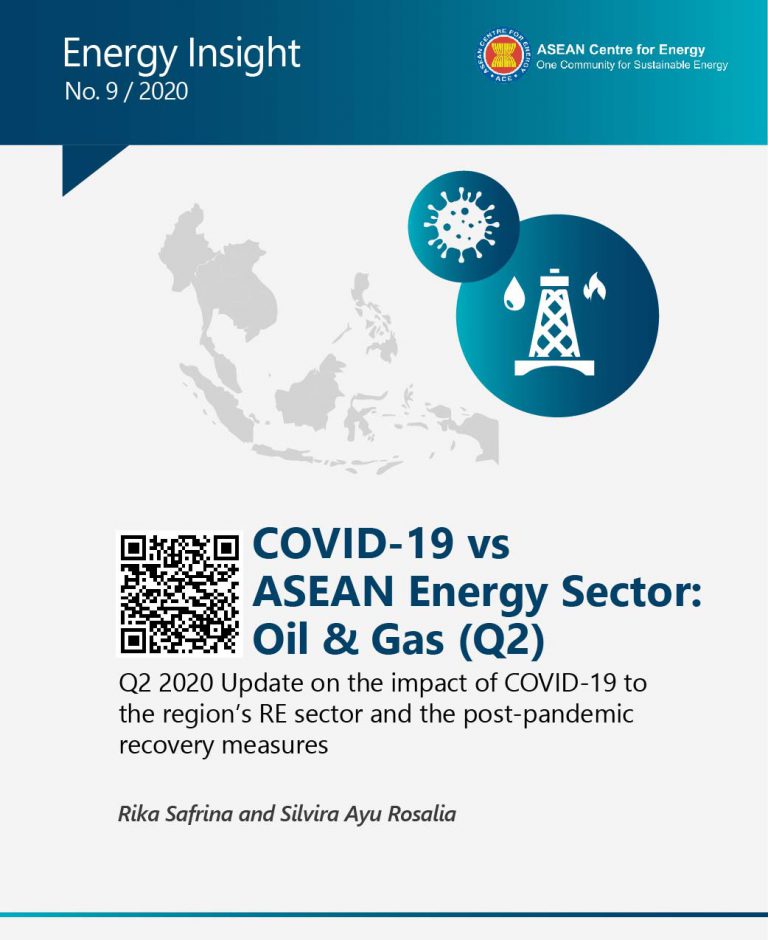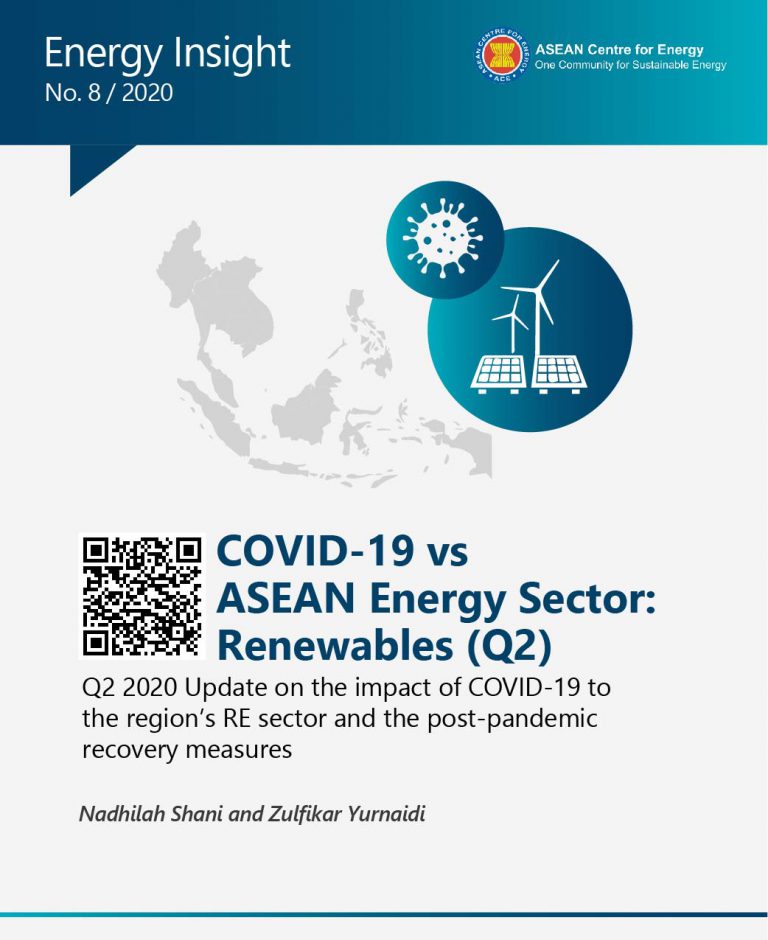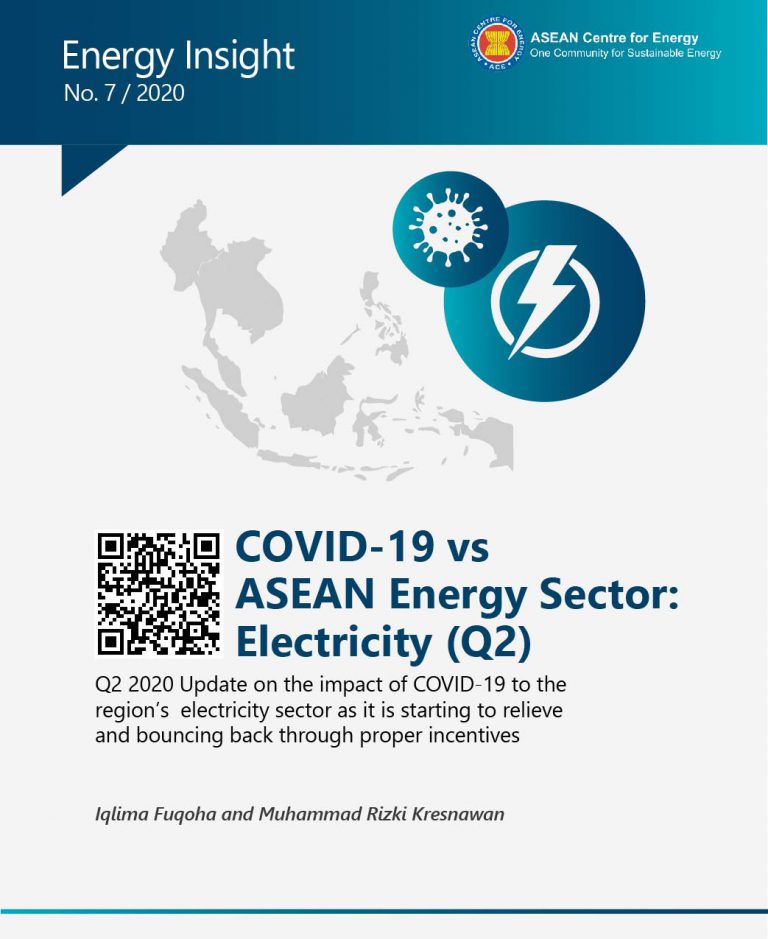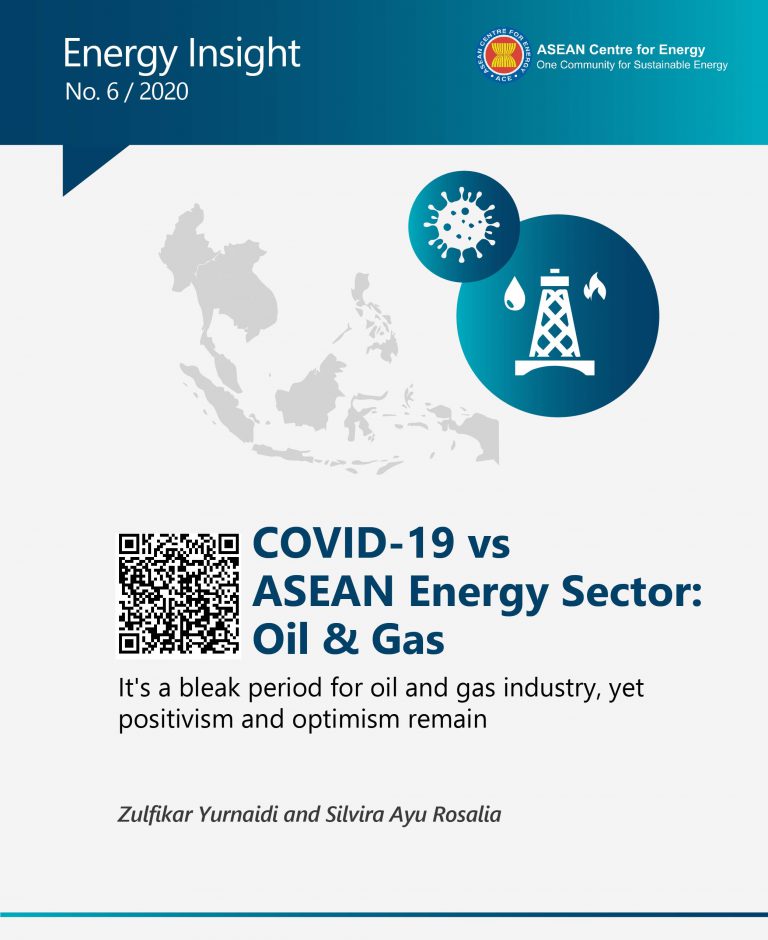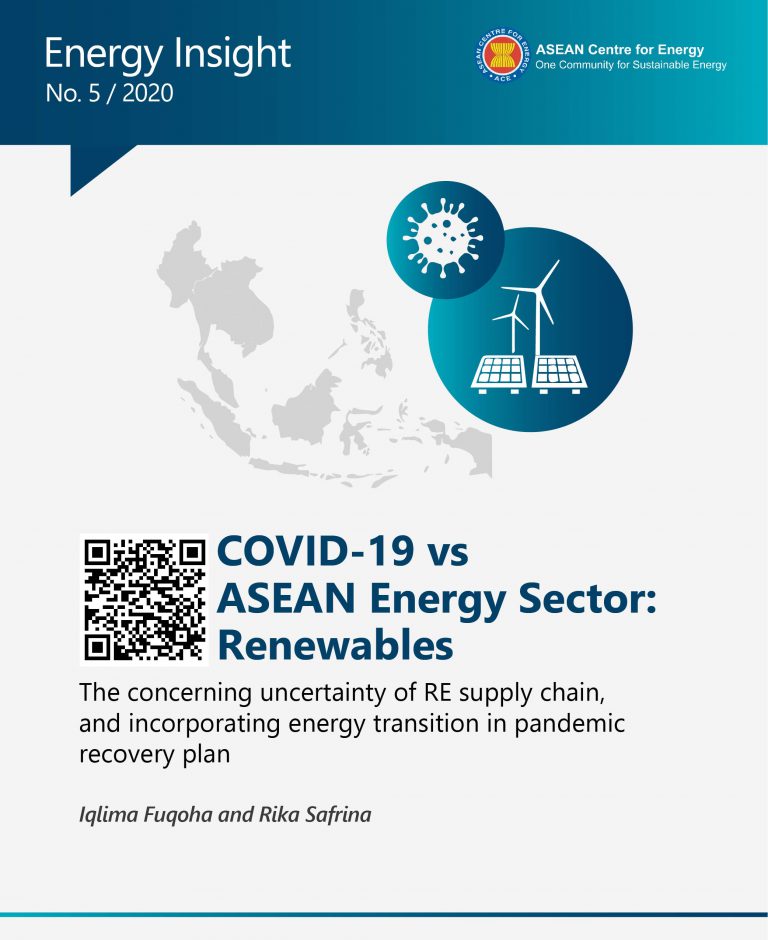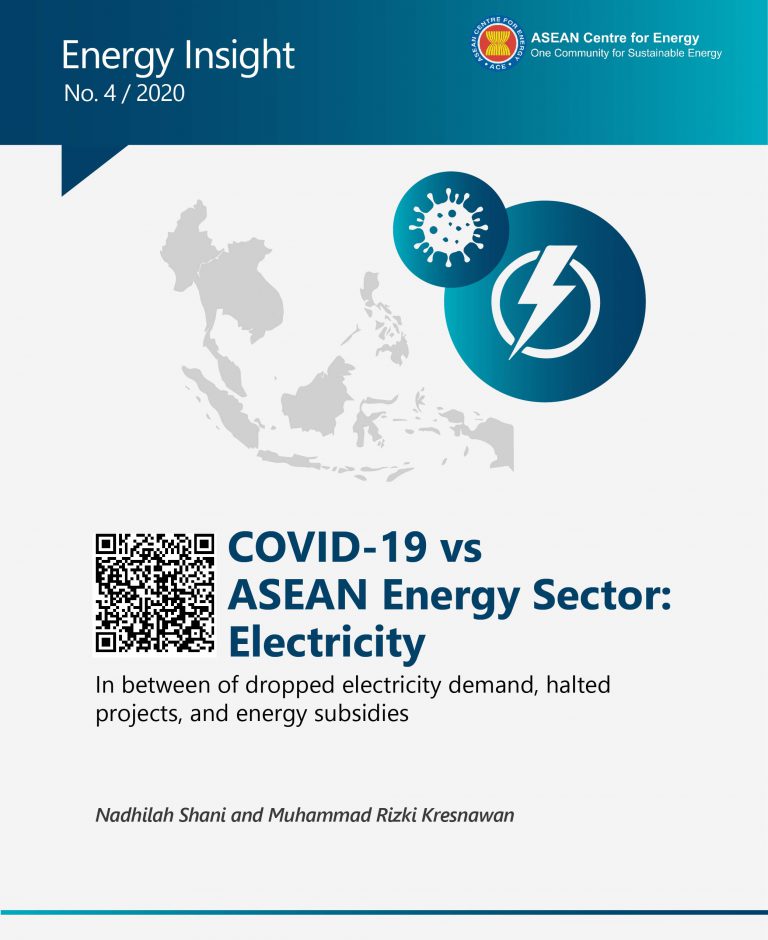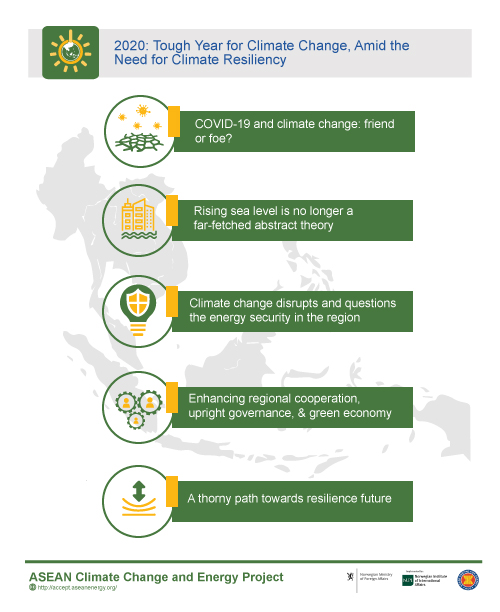COVID-19
Assessing the Impact of COVID-19 Pandemic on Energy and Climate Change in ASEAN
Since the World Health Organization (WHO) declared COVID-19 a pandemic on March 11, the cases of the coronavirus illness have surpassed millions, spreading rapidly to more than 200 countries and territories around the world. Countries in the Southeast Asia region are not inevitable from this crisis. As of now, all 10 ASEAN Member States have been experiencing the growing confirmed case. It does not only present challenges towards public health but also disrupts other sectors, including energy and climate change.
Based on our recent survey, COVID-19 is affecting fossil fuels the most, but renewable energy is also considered to be hit. A positive temporary effect on the climate must be used to mainstream the information about climate change mitigation into the society, must involve in a more sustainable economy, and environmental-friendly activities into daily lives.
Here, we provide various updated information and analysis on the energy and climate change in ASEAN in related to COVID-19.
List
Energy and Climate Policy Tracker on COVID-19
ASEAN | Brunei Darussalam | Cambodia | Indonesia | Lao PDR | Malaysia | Myanmar | Philippines | Singapore | Thailand | Vietnam
ASEAN
Related News
2021 News
- 2 April – Alternative Energy Regulation and the Covid-19 Pandemic Restrict Global Coal Market Growth
- 24 February – Analysis: Emerging Asia’s Clean Energy Projects Limp Back to Normalcy After COVID-Stricken Year
2020 News
- 29 October – Climate Change Action May Seem ‘Optional’ or ‘Too Expensive’ Amid COVID-19 Economic Fallout: UK Ambassador to ASEAN
- 29 October – Asia’s Aspiring ‘Green-Collar’ Workers Hope for Jobs in Covid Recovery
- 20 October – Petronas cutting Myanmar headcount amid strategic review
- 12 October – IMF’s policy at odds with green COVID-19 recovery efforts
- 6 October – Heeding the call for a green recovery
- 30 September – Small countries’ leaders outline visions for progressive cooperation that makes use of their innovation, strengths, as General Assembly debate continues
- 29 September – Science and Scientists Held in High Esteem Across Global Publics
- 28 September – Can ASEAN Balance Growth and Sustainability in Post-Covid Infrastructure Development?
- 28 September – The Future of Digital Banking Services in the ASEAN Region
- 26 September – ASEAN’s Future Energy Landscape Post COVID-19
- 18 September – Five Trends That Can Propel ASEAN’s Growth in Post-Corona Era
- 17 September – COVID and the climate crisis in SE Asia
- 10 September – High profile gas plays in Southeast Asia face uncertain future
- 31 August – Can COVID-19 give new wind to renewable energy?
- 28 August – COVID-19 has prompted stimulus measures, but Southeast Asian governments may be missing the chance to go green: Experts
- 4 August – Covid-induced energy plunge shrinks coal development in Southeast Asia
- 3 August – Business risk and COVID-19 are pushing Asian financiers away from coal
- 3 July – Modernise market and realise greater intra-regional trade, Asean told
- 2 July – ASEAN seen turning to floating solar plants as demand shifts
- 1 July – Philanthropies pump US$50 million into clean energy project in Southeast Asia to address Covid-19 funding gaps
- 30 June – Climate fund targets $2.5 billion in clean energy investment for Southeast Asia
- 30 June – Renewable fund to raise $2.5B for region’s recovery from pandemic
- 23 June – In post-Covid Asia, countries should develop their own renewable energy capabilities
- 22 June – Embracing renewables in ASEAN countries for post COVID-19
- 19 June – Ideal time to paint a greener future
- 15 June – Standing tall: How green buildings are adapting to the post-Covid era
- 5 June – UK seeks to boost ties with Southeast Asia through ASEAN
- 15 May – PH reports significant improvement in air quality
- 14 May – S&P: Indian, ASEAN energy companies tighten financial levers to counter low oil price
- 13 May – Post-pandemic stimulus may slow end of coal in Southeast Asia and Japan
- 12 May – Asia’s pandemic stimulus may slow the demise of coal
- 11 May – COVID-19 will not slow Southeast Asia’s shift from coal to renewables
- 10 May – Air pollution clearing up in Southeast Asia
- 7 May – Air pollution clears in some cities in SE Asia during lockdown, but not all, study finds
- 6 May – KrisEnergy reviewing commerciality of oilfield operations offshore Thailand
- 5 May – Covid-19 offers preview of impact of environmental threats
- 2 May – Global oil price crash leaves ASEAN economies staring down the barrel
- 1 May – Petrol prices drop to $2 level, a week after crude oil’s record lows
- 27 April – Don’t Waste The Pandemic Response
- 24 April – Coronavirus means cheap oil isn’t good news for energy-hungry Southeast Asia
- 24 April – Lower oil prices hurting China and Southeast Asia
- 22 April – COVID-19: 150GW of Asia-Pacific renewables ‘at risk’
- 22 April – Reduce risk of future epidemics by improving climate change commitments now, MPs warn
- 22 April – Southeast Asia’s hydropower boom grinds to a halt as COVID-19 stalls projects
- 21 April – The COVID-19 rice economy: what a pandemic means for Southeast Asia’s staple
- 9 April – Southeast Asia’s renewable energy transition likely to take hit from COVID-19: Experts
Brunei Darussalam
Related News
2020 News
- 1 December – Sarawak Energy shares its response to impact of Covid-19 at virtual summit
- 8 September – Brunei forest cover helps absorb GHG emissions; no Covid-19 cases reported
- 20 May – COVID-19: A reminder for collective efforts against common challenges
- 22 April – Brunei mulls curbing oil output in line with OPEC+ pact
- 3 April – Devout at a distance in contagion-hit Brunei
Cambodia
Key Policy Responses
The authorities have issued a reduction of electricity tariffs for five months starting from June, specifically for manufacturing, agriculture, commercial, and service firms. The bill is expected to be reduced by 25 percent, as a government’s effort to sustain the business operations in those four key sectors.
Related News
2021 News
- 5 April – ADB annual meeting to focus on green recovery
- 9 March – Covid delays WtE power plant
- 2 March – Covid jab campaigns fuelling petrol price hike
2020 News
- 13 October – Liquefied natural gas plans up in the air thanks to Coronavirus
- 5 October – The Impact of COVID-19 on rural women and enterprises: A rapid socio-economic assessment in Cambodia by the empower project
- 1 October – Analysis: COVID-19 delays Cambodia’s LNG ambitions after initial imports from China
- 11 September – Cambodia gets $127.8 million ADB loan to help expand power grid
- 14 July – COVID-19 opens a can of worms for fisherwomen in Cambodia
- 21 June – Cambodia’s Food Insecurity Rises Due to COVID-19
- 14 June – EU bankrolls green energy initiatives
- 26 May – Asia-Pacific falling behind sustainable development goals
- 22 May – Cambodia plans electricity price cut to revive economy
- 21 May – Cambodia gives electricity break to four key sectors for five months
- 18 May – Virus puts Cambodia oil production into question
- 17 May – China-constructed hydroelectric station powers Cambodia’s development against COVID-19
- 12 May – Energy conservation and cost-cutting measures
- 21 April – Cambodia hoping to produce oil this year, despite global slump
- 16 April – Launch of heavy fuel oil power plant sees delays
- 15 April – ‘No plan’ to reduce electricity bills nationwide
- 1 April – Fuel prices lowest since 2008 financial crisis
- 24 March – Mesco Gold’s glittering future temporarily stalled
Indonesia
Key Policy Responses
As a result of the coronavirus pandemic, Indonesia took another step back toward a clean energy economy due to fossil fuel subsidies and hampered clean power plant projects such as geothermal. Indonesia introduces a domestic coal price of $20 below market price in January and set a subsidised fuel quota at 26.87 million kiloliters (mL) as a government position to protect the people’s purchasing power and ensure the business community.
Related News
2021 News
2020 News
- 5 December – UN plan seeks clean energy progress in Indonesia during pandemic
- 3 December – PT SMI, European Union, KfW, and AFD Join Forces to Accelerate Investment in Sustainable Infrastructure in Indonesia
- 24 November – Indonesia turns focus to energy security and renewables amid pandemic
- 2 November – Indonesian coal exporters don’t expect ‘real recovery’ until H2 next year
- 2 November – Indonesia’s commitment to handling climate change undeterred: Minister
- 28 October – PLN books Rp 12.2 trillion net loss as COVID-19 proves double whammy
- 21 October – Pandemic delivers crushing blow to energy, transportation SOEs, deputy minister says
- 17 October – Green recovery to boost environment-based economic transformation: RI
- 7 October – Energy heavyweight Medco books $95m loss in first half
- 4 October – RI at crossroads in climate action journey in wake of pandemic
- 29 September – COVID-19 hits already struggling power firm
- 28 September – Indonesia asks G20 to ensure energy market stability, affordability
- 23 September – French investors’ appetite for Indonesia’s energy sector remains high amid pandemic
- 17 September – Indonesian power sector coal intake to dip in 2020: PLN
- 15 September – Indonesia Coal Exports Retreat As a Result of the Pandemic
- 26 August – PLN eyes Rp 391t in revenue next year, aims for healthy finances
- 25 August – Pertamina hit by triple shock
- 14 August – Indonesia to focus on improving food and energy security amid coronavirus pandemic
- 10 August – 6,500MW power plants, mostly coal, set for delay amid pandemic
- 4 August – 2020 power usage expected to fall by 6 percent as business slumps
- 3 August – Outlook on Indonesian coal exports amid weakening demand in pandemic
- 1 August – Renewable power plant projects continue despite pandemic
- 30 July – Indonesia, NZ include COVID-19 handling in their 2020-2024 Plan of Action
- 29 July – Kayan, Cirata renewable power plant projects continue despite pandemic
- 17 July – Govt prioritizes 4 sectors for guaranteed energy supply amid pandemic
- 16 July – PLN to receive Rp 9.6t from state coffers to build power infrastructure
- 8 July – IEA launches green energy JV in Indonesia
- 5 July – Green Stimulus, Key in Indonesian Post-COVID-19 Economic Recovery
- 3 July – Indonesian coal miners to cut 50 million tons of production due to weak prices
- 2 July – Indonesia’s LNG imports continue to rise despite economic downturn
- 1 July – Indonesian radio gets COVID creative to communicate climate crisis
- 1 July – ‘It sends a negative message’: Hydropower players lament PLN power cap in Sumatra
- 30 June – Indonesia’s LNG imports continue rising
- 27 June – Activist, residents demand South Korea withdraw from Banten power plant projects.
- 27 June – Pertamina’s fuel sales rise as Indonesia eases virus curbs
- 25 June – Indonesia state power company PLN cuts capex by nearly half this year
- 25 June – Energy ministry’s budget cut by a third to Rp 6.2 trillion
- 19 June – Indonesia working on $1b solar-driven green economic recovery scheme
- 18 June – Batang Toru $1.5b hydropower plant may be delayed by years
- 16 June – Indonesia pushes back target for palm oil fuel refinery to 2026
- 11 June – SKK Migas lowers upstream oil and gas investment target this year
- 8 June – Energy ministry rejects miners’ request for relaxation on coal royalties
- 1 June – Govt Should Review Energy Prices: Apindo
- 29 May – Sustainable development crucial in Indonesia’s COVID-19 recovery, experts say
- 26 May – 11 companies sign deals to buy gas at lower prices
- 26 May – Pertamina opens up new oil and gas well despite weak oil prices
- 20 May – Indonesia’s clean energy program faces setback, ETI ranking plunges
- 20 May – INDONESIA CUTS 2020 PALM OIL EXPORT OUTLOOK BY 12%
- 19 May – Indonesian coal miners suffer impact from India’s lockdown
- 18 May – Indonesia govt allows Pertamina to sell unblended diesel to fuel importers
- 17 May – Indonesian govt plans $8.6 bln coronavirus bailout for state firms
- 13 May – Energy, utility companies cut costs to survive slumping demand
- 12 May – Expanding Costs for the Biodiesel Program
- 11 May – PLN in Indonesia seeks to renegotiate contracts with IPPs in light of covid-19
- 9 May – Hit by oil crash, Indonesia set to delay B40 biodiesel, stay with B30 for now
- 7 May – Coronavirus, climate change cause food shortages in parts of Indonesia
- 6 May – Bukit Asam to cut capex amid falling demand from PLN, India
- 6 May – Indonesia to discuss how to continue biodiesel program amid falling fuel prices
- 6 May – Virus, climate change cause food shortages in parts of Indonesia
- 5 May – Covid-19 opportunity to enhance our environmental commitments
- 5 May – Demand for photovoltaic panel plummets in Indonesia amid pandemic
- 4 May – Indonesian government to delay auction of geothermal working areas this year
- 4 May – Indonesia’s airports apply operational efficiency amid COVID-19: AP II
- 4 May – Refusing to Lower Fuel Prices, Govt: Global Prices Not Stable Yet
- 4 May – Indonesia’s Bukit Asam reports Q1 output down 3.5 per cent, reviews target
- 23 April – Forest fires in Indonesia set to add toxic haze to COVID-19 woes
- 22 April – Indonesia asks importers to buy domestic diesel as coronavirus hits demand
- 22 April – Indonesia hires tankers to store fuel at sea while seeking bargains
- 16 April – Over a million low-income households left out of electricity relief scheme
- 14 April – Air quality in Jakarta is improving, for now
- 14 April – Indonesia won’t ‘sacrifice economy’ for more ambitious emissions cuts
- 13 April – Indonesia’s coal consumption may fall 5 percent as virus spreads: Energy ministry
- 6 April – Indonesia’s Pertamina Q1 crude output slightly below target
- 31 March – Mining activity in Indonesia takes a hit from COVID-19 pandemic
- 28 March – COVID-19 won’t stop Indonesia marking Earth Hour
- 16 March – Energy Ministry may lower coal production target as Chinese demand falls
Lao PDR
Key Policy Responses
The authorities issued the Relief and Public Sector Expenditure Measures to Reduce the Impact from the COVID-19 Pandemic. Relief measures are primarily concerned with tax relief such as salary tax exemption, Deferment of payments for affected businesses, Profit tax exemption for micro-enterprises, etc. Meanwhile Public Sector Expenditures maintain large-scale investment project through the reduction of administrative expenses.
Related News
2020 News
- 19 August – Unscathed by COVID-19, Laos Gambles on Megaprojects to Revive Its Economy
- 19 July – Laos: Govt issues notice to lower residential electricity prices
- 2 July – Locust Plague: Crisis Within A Crisis
- 29 May – Isaan Mekong basin network concerns the Sanakham hydropower push
- 6 April – Ministry Orders Temporary Suspension of Mining Activities, Hydropower Construction
- 2 April – Laos Provides Tax Relief and Other Measures to Reduce the Economic Impact of COVID-19
Malaysia
Key Policy Responses
In response to the COVID-19 outbreak, the government deferred the implementation of the national B20 program due to lower crude palm oil (CPO) demand and focus response to resources. The government also decided to extend discounts offered on electricity bills, as announced under the Prihatin Economic Stimulus Package, until December 2020.
Related News
2020 News
- 23 December – Power demand to rebound 6.0pct in 2021
- 23 December – Good news! TNB to offer rebates from Jan 1, current tariffs maintained
- 16 December – Electricity demand dips, renewable energy gains momentum
- 27 November – Petronas posts nine-months loss
- 27 November – Malaysia’s Petronas warns of challenging fourth quarter amid volatile oil prices
- 21 October – Gas Malaysia stays committed to green initiatives
- 6 October – Gas Malaysia remains committed to fuelling the nation with clean energy
- 18 September – Fraziali Ismail: COVID-19 and climate change, collective responsibility, commitment, and collaboration
- 15 September – Oil demand set for slow recovery from virus, says energy agency
- 15 September – REFILE-UPDATE 1-Pandemic’s “great reset” pushes energy firms toward renewables, hydrogen – execs
- 9 September – Finance minister: Electricity bill discounts worth RM1.67b given as of Aug 31
- 7 September – Petronas to deepen push into RE after posting RM21b loss
- 4 September – Malaysia’s Petronas to reshape portfolio after quarterly loss
- 31 August – Shocks in oil and gas industry weigh on financial performance
- 31 August – Positive outlook for renewable energy
- 28 August – TNB net profit declines to RM653.30m in Q2
- 28 August – A green recovery of the global economy — Kim Jensen
- 20 July – Malaysia bets on large scale solar PV to revive economy
- 12 July – Baleh hydro project on track despite MCO, Covid-19, says Sarawak Energy
- 4 July – Oil prices outlook still uncertain as demand slow down, says Malaysia’s Sapura
- 3 July – Details of Bantuan Prihatin Elektrik included in TNB’s July bill
- 3 July – Consumer groups laud move to extend electricity discount
- 2 July –Putrajaya announces extension of electricity bill discounts to Dec 2020
- 1 July – Give us more assistance to recover, FMM requests energy providers
- 29 June – Sarawak govt steps in to revive 23 delayed Rural Electrification Scheme projects
- 28 June – Peninsular Malaysia reportedly among foremost beneficiaries of electricity relief
- 23 June – Urban Futures: The new normal demands a new economic model
- 20 June – Energy minister: Four million domestic users whose bills are under RM77 get three months’ free electricity supply
- 30 May – Residential electricity usage soar 23pc during MCO, says Energy Ministry
- 21 May – Covid-19 pandemic causes labour shortage for Malaysia’s palm industry
- 23 April – MPOB: Govt defers B20 fuel programme rollout
- 21 April – Quick take: Oil and gas counters fall after oil price crashes
- 20 April – How TNB weather through low power demand
- 16 April – IDEAS: Malaysia may lose RM31 bill per year if oil prices remain at US$30 per barrel
- 15 April – Energy consumption reeling from COVID-19, MCO
- 13 April – Malaysian senator builds solar-powered buggy while under home quarantine for COVID-19
- 9 April – COVID-19: 3 Lessons for Climate Change
- 3 April – Thail company could delay projects in Malaysia and elsewhere due to oil price collapse
- 1 April – Practise power conservation at home during MCO
- 25 March – Extension of Malaysia lockdown hurts biomass output
- 23 March – Malaysia coal-fired generation falls on virus shutdowns
- 23 March – TNB Initiatives to Help Combat COVID-19
- 18 February – Stable earning for TNB, but Covid-19 reduces power demand
Myanmar
Key Policy Responses
The authorities scheduled to resume two of five emergency power projects by May should be up and running by September. In addition, the government will be extending the deadline for the monthly power tariff in Yangon as part of measures to avoid unnecessary mass gathering during the COVID-19 pandemic.
Related News
2020 News
- 23 November – Myanmar maps out recovery and reform
- 20 October – Petronas cutting Myanmar headcount amid strategic review
- 2 October – Yangon Power Demand Hit by Lockdown
- 28 September – Myanmar Govt Vows to ‘Build Back Better’ With Latest COVID-19 Recovery Plans
- 14 July – EU envoy pledges support for Myanmar economy amid COVID-19
- 3 July – Myanmar LNG projects overcome pandemic and sceptics
- 3 June – Solar tender deadline extended, but grave problems remain
- 26 May – Myanmar Power Plants Delayed by COVID-19 to Start Operating in Coming Months
- 25 May – No air quality dividend for Yangon amid COVID-19
- 19 May – Myanmar Power Plants Delayed by COVID-19 to Start Operating in Coming Months
- 20 April – Govt extends power bill payment deadline in Yangon
- 7 April – Households exempted from first 150 units of electricity in April
- 5 April – Myanmar to face power shortages as emergency plants miss deadlines
- 6 March – COVID-19: Myanmar still safe but counts cost of global outbreak
- 3 March – Gov’t faces hydropower project delays due to COVID-19
Philippines
Key Policy Responses
In April, The authorities will provide free electricity for March and April to support low-income households during the COVID-19 pandemic. They also cancel penalties, interest, and fees for late payment. The collapse of world oil prices did not shake the Philippines because they were not oil exporters. Then, In May, the Philippines President temporarily increased tariffs on imported crude oil and refined petroleum products aimed at mitigating the economic impact of the coronavirus outbreak. Since July, the Department of Energy (DOE) is advancing a policy re-casting that will allow full ownership in renewable energy (RE) projects.
Related News
2021 News
2020 News
- 22 November – Philippines Declares Moratorium On New Coal Power Projects Amid Renewable Energy Push
- 16 November – Marcos wants DOE to suspend oil price hikes due to pandemic, calamities
- 12 October – Rising power demand signals economic recovery – Meralco
- 7 October – Harnessing Digital Technologies Can Help Philippines Overcome Impact of Pandemic
- 21 September – AC Energy, Shell put on positive post-pandemic outlook
- 21 September – AC Energy: Business back on track
- 21 September – Green recovery key to reviving virus-hit economies
- 14 September – Coronavirus pandemic fuelling plant poaching in Philippines
- 12 September – Power consumption seen to drop by 6%
- 9 September – Meralco power bills to go down for fifth straight month
- 1 September – Power rate discounts exclusively for marginalized consumers pushed
- 31 August – Can COVID-19 give new wind to renewable energy?
- 27 August – Meralco fined ₱19 million over ‘bill shock’ amid lockdown
- 27 August – Philippine energy chief says 4 LNG projects still on track despite virus delays
- 16 August – DOE to review PH energy plan
- 28 July – Energy chief orders fast tracking of renewable energy program
- 21 July – Additional coal supply in Covid-era Philippines will increase electricity costs for consumers, experts say
- 12 July – PH to open RE for 100% foreign ownership
- 7 July – As power bills surge amid Covid-19, will prosumers be the Philippines’ next big energy trend?
- 23 June – PHL urged to switch to ‘resilient’ renewables after the pandemic
- 30 May – DOE sets GCQ protocols for energy companies
- 29 May – Meralco: Waiving electric fees may cause ripple effect to entire power supply chain
- 26 May – Philippines’ Petron suspends 180,000-bpd Bataan refinery as pandemic bites
- 26 May – DOE issues COVID-19 response protocol for energy sector
- 23 May – PH eyes stockpiling of crude oil amid cheap global prices
- 20 May – Philippines’ DOE says bioethanol blending program to continue amid reports of suspension
- 19 May – Beyond lockdown: Will Philippines be able to sustain low air-pollution levels?
- 18 May – Firms seen to defer PH exploration plans
- 11 May – Philippines Central Bank Offers Support for Energy Transition and Renewable : IEEFA
- 9 May – Solar firms brace for ‘new normal’
- 8 May – Study: Air pollution level in parts of Manila drops amid lockdown
- 7 May – First Gen watches ‘very low’ LNG prices as PHL prepares to import
- 5 May – SunPower accesses $1 billion in residential solar and storage loan capital from Tech CU
- 5 May – Shell Halts Philippines Oil Refinery As Demand Collapses
- 4 May – Gas, diesel pump prices down by 20%, but benefit hardly felt with ECQ
- 4 May – Philippines’ Duterte hikes tariffs on imported oil, refined petroleum
- 28 April – As people stay indoors, power demand drops during lockdown-Meralco
- 26 April – Climate Change Commission revises tack in the wake of COVID-19
- 23 April – Electricity market prices expected to increase post-ECQ
- 23 April – Manila gets its skyline back as air quality improves amid COVID-19 lockdown
- 22 April – CHR pushes advocacy for nature, climate change
- 22 April – Oil price drop during pandemic a win for Philippines – NEDA chief
- 21 April – DOE issues updated payment guidelines due to extended ECQ
- 21 April – LNG market favorable in next few years due to low prices
- 20 April – Unioil sets off price cut: P1.20/liter
- 16 April – ERC orders staggered payment scheme for electricity bills
- 15 April – Free electricity for March and April for low-income households
- 14 April – Indefinite extension of EC power bills’ settlement backed
- 14 April – DOE lauds downstream oil industry for its COVID-19 efforts
- 14 April – DOE directs power firms to submit report on project delays
- 13 April – ECs to subsidize power needs of poor consumers
- 11 April – PH energy demand drops
- 7 April – NEA backs appeal to ‘indefinitely’ extend power coops’ payments
- 7 April – ERC allows reduction of transmission rates
- 4 April – Air pollution has gone down as much as 74 percent in Manila
- 3 April – LUZON PEAK POWER CONSUMPTION DIPS 20-30% ON LOCKDOWN–NGCP
- 2 April – Mindoro-Cuyo basin bid suspended
- 30 March – Demand for electricity drops sharply amid quarantine
- 30 March – Meralco expects sales to drop in March
- 28 March – Electric cooperatives extend payment period
- 27 March – DOE calls for continuous service of industry players amid COVID-19
- 23 March – EDC assures uninterrupted geothermal operations during community quarantine
- 22 March – Meralco billing customers based on 3-month average
- 19 March – Energy chief flags delays in power investments due to Luzon lockdown
- 19 March – Philippines to ensure 24/7 energy supply, as lockdown seen to slow power projects
- 19 March – Electricity demand drops 30% due to lockdown
- 17 March – Scientists studying possible links between COVID-19, climate change
- 17 March – Energy companies are business as usual
- 15 March – LIST: Power interruptions in Metro Manila during quarantine
- 27 February – MGen projects delayed as deliveries from China hit snag
- 25 February – Coronavirus delays 135MW solar duo by Philippines utility
Singapore
Key Policy Responses
In May, the authorities consider that the crisis due to COVID-19 is an opportunity to accelerate the transition of energy towards safe and sustainable energy. They plan to continue to develop low-carbon energy and continue to decarbonize their energy systems.
Related News
2021 News
2020 News
- 11 December – Cutting carbon a new focus area for Singapore under five-year research masterplan
- 7 December – Singapore can add to global recovery from Covid-19 with investment in innovation, collaboration: DPM Heng
- 26 November – Going green will mean $1.35 trillion in opportunities for Asean economies: Report
- 26 October – International energy convention kicks off in Singapore with mass Covid-19 testing
- 14 October – Parliament: Increased household electricity and gas consumption from April to July due to Covid-19 measures
- 12 October – Nicole Han moves from Vital Strategies to climate action group 350.org to lead Asia Pacific communications
- 2 October – Climate change, Covid-19 will shape future of Singapore’s built environment: Desmond Lee
- 21 September – Singapore has big driverless ambitions and the pandemic is unlikely to stop them
- 17 September – Governments should invest to overcome the coronavirus crisis — but don’t forget climate change, says expert
- 27 August – S’pore government lays out plans to tackle climate change, thrive sustainably in post-Covid future
- 1 July – Philanthropies pump US$50 million into clean energy projects in Southeast Asia to address Covid-19 funding gaps
- 18 June – Protecting Singapore’s economy from climate change and Covid-19
- 8 June – Amid the pandemic, how can businesses not lose sight of climate change?
- 1 June – Singapore’s Infrastructure Asia, World Bank Group and SMU launch infrastructure capability programme for regional officials
- 27 May – Singapore and New Zealand emerging from Covid-19 pandemic, look to reopening borders
- 21 May – Singapore postpones packaging reduction deadline for companies in light of Covid-19 disruption
- 19 May – Singapore refineries starting to cut output amid pandemic pains
- 17 May – Commentary: How Singapore will remain a top trading hub in a post-pandemic world
- 6 May – HSBC Targets Singapore Oil Trader ZenRock Over Finance Deals
- 6 May – Minerva Bunkering on expansion drive after bolstering Singapore presence
- 6 May – Singapore air quality improves amid reduced activities
- 5 May – Coronavirus: Air quality improves as Singapore slows down under circuit breaker measures
- 5 May – Here’s how you can track your carbon footprint and help keep emissions low
- 4 May – Coronavirus: Pandemic’s disruption of energy sector holds insights for a fossil fuel-free future
- 28 April – Tankers thrive while oil tanks in Singapore
- 27 April – Households can expect electricity bill to go up as more work from home during Covid-19 outbreak
- 27 April – Singapore coastline packed with ships full of oil no one wants
- 21 April – Pump prices in Singapore remain unchanged despite plunge in oil prices
- 21 April – Singapore says oil trading sector resilient despite global demand drop
- 8 April – Japan, Singapore lockdowns to stifle Asian gas, power demand further
- 28 March – Covid-19 crisis not a solution to climate change, but a learning opportunity: Earth Hour 2020 organiser
- 24 March – Jet fuel refining margins turn negative as airlines ground fleets
- 23 March – COVID-19: Singapore Airlines slashes 96% of capacity, grounds most planes
- 17 March – Singapore energy, petchem firms face Malaysia lockdown
- 18 February – Oil prices slip as coronavirus concerns linger
Thailand
Key Policy Responses
In April, Even with this COVID-19 pandemic going around the world, Thailand still aims to become a regional LNG hub and keeps factories running by cutting electricity charges. Not only for factories, but they also cutting electricity charges for 22 million houses. In June, State-owned Thai oil and gas company, PTT Pcl, cut its investment budget by 10-15% whilst Committee on Energy Policy Administration (CEPA) extends discounts on LPG for households and NGV for taxis.
Related News
2021 News
- 7 March – Thailand freezes electricity charges until August billing cycle
- 25 January – Vaccinating Asean for a Lower-Carbon Future
- 20 January – Eppo: Energy contraction set to persist
2020 News
- 21 October – Eppo urges delay in LNG imports by power firms
- 13 October – Renewable power scheme conditions set
- 5 August – EA vehicle deliveries kneecapped by pandemic
- 24 July – Additional coal supply in Covid-era Philippines will increase electricity costs for consumers, experts say
- 1 July – Energy minister comes up with plan to spark Thai economy
- 1 July – Cabinet accepts B200bm in energy schemes
- 26 June – Energy spending sped up
- 16 June – Thailand extends discounts on LPG for households and NGV for taxis
- 12 June – Thai energy group PTT cuts 2020 investment by up to $1.2 billion
- 5 June – Renewable energy giants in Thailand forecast big rise in profits
- 5 June – Electricity discount has been switched off
- 2 June – Egat puts together delay plan for SPPs
- 20 May – ‘Tesla of Thailand’ keeps factories running in virus lockdown
- 29 April – US oil price faces 2nd decrease below zero
- 28 April – Ministry keen to build LNG stockpile while prices low
- 28 April – Thai refinery IRPC delays $1 bln chemical project amid coronavirus outbreak
- 28 April – Bangkok breathes cleaner air during COVID-19 pandemic and experts want it to last
- 24 April – Thailand energy commission considering cutting electricity charges to help businesses
- 22 April – Cabinet gives nod to slash power bills
- 22 April – No negative oil prices in Thailand
- 21 April – Single Use Plastic Making a Comeback in Thailand Thanks to Covid-19
- 21 April – Ratch Public : contributes 15 million baht joining energy sector to produce Ethanol Alcohol for COVID-19 high-risk people across the nation
- 21 April – Power bill cut for 22m houses
- 21 April – FTI calls for power bills to be suspended
- 21 April – Fitch Downgrades Bangkok Aviation Fuel Services to ‘A-(tha)’; Outlook Negative
- 21 April – Covid 19 electricity price reductions overshadowed by reports of skyrocketing energy bills nationwide
- 20 April – Electricity bill subsidies proposed
- 16 April – ERC orders staggered payment scheme for electricity bills
- 15 April – Fuel retailers abandon plans as virus cripples demand
- 10 April – Oil reserves reduction readied
- 7 April – Thailand aims to become regional LNG hub despite Covid-19 crisis
- 7 April – Analysts predict earnings backslide
- 2 April – Oil market reels from virus
- 2 April – Thailand’s PTTEP could delay some projects due to oil price collapse
- 25 March – Energy Ministry to cut price of CNG by 3 baht
- 25 March – Thai oil refiners cut output as fuel demand falls: sources
- 13 March – Virus-related cooking gas price cut
- 9 March – Power shift
Vietnam
Key Policy Responses
In March, The authorities have announced that there will be no price increases until the end of Q2 while promoting renewables by approving regulation towards cheaper green energy, even during this COVID-19 pandemic. While in April, The Ministry of Industry and Trade (MoIT) has decided to cut power bills for businesses and households by 10 percent over the next three months,
Related News
2021 News
- 5 March – Covid-19 again delays Hanoi waste-to-energy plant
- 23 January – Solar power charges pandemic recovery for indigenous farmers in Viet Nam
2020 News
- 18 December – Vietnam gives second electricity discount as Covid-19 relief
- 25 November – PetroVietnam says annual output unaffected by COVID-19 pandemic
- 19 November – Vietnam pioneers post-pandemic carbon pricinge
- 24 August – Power companies face hardship in pandemic
- 2 July – Improving business climate critical to post-pandemic growth
- 22 June – COVID-19 Could Cause A Boom In Coal Power
- 6 June – WB provides US$84.4 million for Vietnam to promote climate-resilient landscapes
- 12 May – EU, French agency support VietNam’s resilience to climate change, COVID-19
- 11 May – Investors concern about wind power development
- 9 May – PM asks nation to save electricity
- 6 May – Việt Nam offers tremendous investment opportunities: VinaCapital CEO
- 4 May – Energy in ASEAN: Renewable Energy in Vietnam
- 28 April – Thai firms expanding presence in Vietnam despite COVID-19
- 24 April – Vietnam Needs to Act Now to Mitigate Wind energy Disruptions
- 14 April – Vietnam has high petroleum stockpile
- 14 April – Vietnam warns of refinery closures amid demand slump
- 14 April – Ministry approves 10 percent to power bills cut
- 7 April – Vietnam finally unveils new FITs for large-scale, rooftop, floating PV
- 7 April – In bittersweet move, Vietnam approves second feed-in-tariff scheme for solar
- 3 April – Vietnam’s Dung Quat oil refinery cuts output on virus-hit demand
- 29 March – Earth Hour 2020 goes online globally amid Covid-19 pandemic
- 27 March – Covid-19 knocking the lights out in Vietnam
- 13 March – No electricity price increases until the end of Q2


